Raising backyard chickens has its unique challenges and rewards. One question that often arises when discussing the chicken diet is, can chickens eat moldy food? Let’s address that right off the bat – no, feeding your chickens moldy food is not a good idea.
Now, you might wonder why I feel so strongly about this. Well, it comes from years of raising chickens and researching their diet extensively. Moldy food can carry harmful toxins that can compromise the health of your flock, affecting not only the birds themselves but also the quality of their eggs and meat.
This article will explore why moldy food is a no-no for your feathered friends. We’ll look at the fundamentals of the chicken diet, explore the science behind mold and its effects, draw upon real-life experiences of poultry keepers, and finally, provide tips on avoiding mold in chicken feed. Whether you’re a seasoned chicken farmer or a newbie, this comprehensive guide will help ensure your chickens get the healthy diet they need.
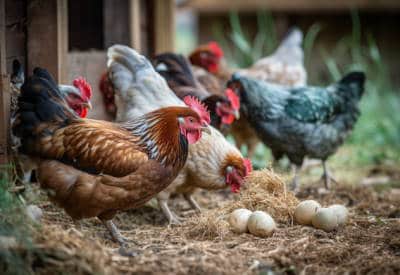
Understanding Chicken Diet: Basics and Beyond
Chickens are intriguing creatures, particularly when it comes to their dietary habits. As we delve into their dietary world, you’ll find it’s not as straightforward as you imagined.
Overview of a Chicken’s Typical Diet
A chicken’s diet is quite varied, with its natural diet including a mixture of seeds, insects, grains, and vegetation. Chickens are omnivorous, meaning they’ll happily munch on plant matter and small animals, like insects or worms.
How Chickens Digest Food
The way chickens digest their food is fascinating. They don’t have teeth like us; instead, they have a specialized organ called a gizzard. Chickens swallow food, and small stones they’ve ingested help grind the food in the gizzard. This allows the nutrients to be absorbed when the food moves into the intestines.
The Role of Bacteria in Chicken’s Digestion Process
Just like humans, chickens also have beneficial bacteria in their gut, aiding digestion and contributing to their overall health. A healthy balance of these bacteria is crucial, as it aids nutrient absorption and helps ward off harmful bacteria.
[ChickenAffiliate]
The Concept of Mold and Its Implications
Understanding mold and its implications is key to making the right dietary decisions for your chickens. Let’s look at mold and how it can affect your flock.
What is Mold?
Mold is a type of fungus that flourishes in damp, warm environments. You can find it on decaying food and plant matter. Certain types of mold produce mycotoxins, harmful substances that can negatively impact the health of both humans and animals.
How Mold Develops in Food
Mold spores are omnipresent in the environment, but they particularly love humid, warm conditions. When food is improperly stored or left too long, mold spores can land on it and begin to grow.
Harmful Effects of Mold on Animals
Mold ingestion can have detrimental effects on animals. Depending on the type of mold and the amount consumed, animals can experience symptoms ranging from digestive problems to severe illnesses like mycotoxicosis, a condition caused by consuming mycotoxins.
Can Chickens Eat Moldy Food: The Science
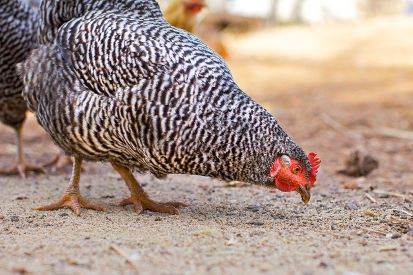
Now, to the main question: Can chickens eat moldy food? Let’s explore what science has to say.
Overview of Existing Research
Research on the subject of chickens consuming moldy food is limited but noteworthy. Most studies conclude that eating moldy food is risky for chickens.
Studies on Chickens and Mold Consumption
Specific studies have found that certain molds and mycotoxins can negatively affect chicken health. For instance, aflatoxins produced by Aspergillus molds have been linked to reduced egg production, impaired growth, and liver damage in chickens.
Possible Impacts of Moldy Food on Chickens
Considering these studies, the possible impacts of moldy food on chickens are primarily health-related. Chickens consuming moldy feed can suffer from digestive issues, a weakened immune system, and decreased productivity.
Potential Risks of Feeding Chickens Moldy Food
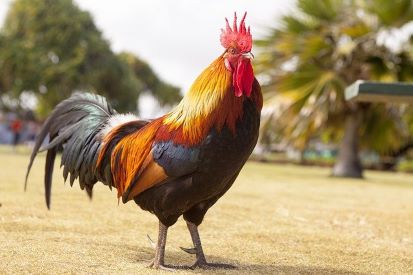
The potential risks when chickens eat moldy food go beyond individual health concerns. Let’s look at some of these broader implications.
Digestive Issues and Health Risks
Like other animals, chickens can develop serious health issues after consuming moldy food. These problems may include diarrhea, vomiting, a decrease in appetite, and in severe cases, neurological disorders or death.
Reduced Egg Production and Quality
Moldy feed can impact egg production significantly. It not only reduces the quantity but can also affect egg quality. Eggs might become smaller, have thinner shells, and the yolks may not be as rich in color.
Long-term Consequences for Chicken Health
Long-term consumption of moldy food can lead to chronic health problems in chickens. These can include ongoing digestive issues, a persistent decrease in egg production, and a shorter lifespan.
Symptoms and Treatment of Mycotoxicosis in Chickens
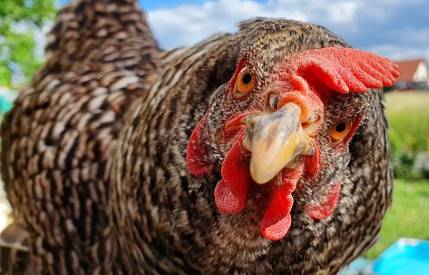
Mycotoxicosis, or mold toxicity, is a serious health concern that can arise when chickens consume moldy food. Knowing how to spot the signs and treat the condition is crucial for all chicken owners.
Recognizing Symptoms of Mycotoxicosis
Mycotoxicosis symptoms can vary depending on the type of mold ingested and the amount consumed. However, common symptoms include:
- Decreased appetite and sudden weight loss
- Lethargy or unusual behavior
- Diarrhea or changes in droppings
- Decrease in egg production or changes in egg quality
- Difficulty breathing or other respiratory issues
- Neurological signs like tremors or uncoordinated movements
It’s important to keep a close eye on your flock and get to know their normal behaviors, as changes can often be the first sign of health issues.
What to Do If Chickens Have Eaten Moldy Food
If you suspect your chickens have eaten moldy food, the first step is to remove the contaminated feed immediately. Isolate birds showing signs of illness to prevent potential spread and monitor them closely.
Treatment and Recovery Process
Treatment for mycotoxicosis primarily involves supportive care, such as ensuring the birds have access to fresh, clean water and providing high-quality, mold-free feed. Probiotics may also be beneficial in helping to rebalance gut bacteria.
However, severe cases may require veterinary intervention. This could include using specific binding agents that can help reduce the absorption of mycotoxins in the gut or other treatments based on the specific symptoms the bird is showing.
Remember, it’s always better to prevent mold from developing in your chicken’s feed rather than dealing with the effects of mycotoxicosis. Proper feed storage and regular feed checks are crucial in maintaining the health of your flock.
Real-life Instances and Experiences of Poultry Keepers
Beyond the scientific studies, real-life experiences of poultry keepers offer invaluable insights into the impact of moldy feed on chickens.
Case Studies of Chickens Eating Moldy Food
Numerous accounts from chicken keepers have highlighted the dangers of feeding moldy food to chickens. Some chickens have displayed immediate signs of discomfort after eating moldy feed, while others have experienced a decline in health over time.
Poultry Keepers’ Observations and Recommendations
Based on their experiences, most poultry keepers strongly advise against feeding moldy food to chickens. Even if some chickens appear to eat moldy food without immediate apparent harm, the potential long-term health risks are too great to ignore.
Effect on the Quality of Chicken Meat and Eggs
Poultry keepers also report that the quality of chicken meat and eggs can diminish if the birds consume moldy food regularly. This can translate to economic losses for those raising chickens for meat and eggs.
How to Avoid Mold in Chicken Feed
While mold in chicken feed can pose a serious problem, there are steps you can take to prevent this issue.
Tips for Proper Storage of Chicken Feed
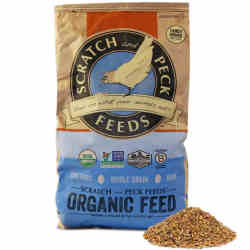
The proper storage of chicken feed is paramount to prevent mold growth. Store it in a cool, dry place, preferably in an airtight container, and ensure it’s used within its freshness date.
Signs of Mold to Watch Out For
Mold is not always visible to the naked eye. Sometimes, it may only be detectable by smell. So, if your chicken feed has a musty or off smell, it might be best to discard it.
Alternatives to Feed Chickens when Regular Feed is Contaminated
If your regular feed is contaminated with mold, don’t panic. You can provide alternatives like fresh fruits, vegetables, and grains until you get new, mold-free feed. Always remember the health of your chickens is a top priority!
What Unusual Foods Can Chickens Eat?
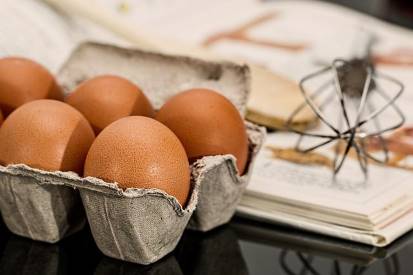
Chickens are notorious for being unfussy eaters; sometimes, their culinary choices can surprise us. There are several unusual items that chickens can benefit from consuming. Let’s have a look at some of them.
Egg Shells
Believe it or not, egg shells can be a fantastic addition to your chickens’ diet. They are rich in calcium, essential for laying hens to produce strong, healthy eggs. The shells should be crushed before feeding to avoid encouraging egg-eating habits in your flock.
Read More: Can Chickens Eat Egg Shells? Unscrambling The Truth
Coffee Grounds
While chickens might show interest in your discarded coffee grounds, it’s best not to indulge them. Caffeine is not good for chickens and can have harmful effects. Coffee grounds also have a bitter taste, which is not exactly a favorite among chickens.
Read More: Can Chickens Eat Coffee Grounds? The Surprising Truth Revealed
Rocks
While it might seem odd, small rocks, especially grit or pebbles, play an essential part in a chicken’s diet. Chickens don’t have teeth to grind food; instead, they use grit stored in their gizzard to break down their food for digestion. Just ensure the rocks are small enough for them to safely ingest.
Read More: Do Chickens Eat Rocks? Unraveling The Gritty Truth
Diatomaceous Earth
Diatomaceous earth (DE) is a soft sedimentary rock that can be crumbled into a fine white powder. It’s often used in chicken coops as a natural pesticide. While chickens can ingest small amounts without harm, and it’s believed to help with internal parasites, DE can be harmful in large quantities and is best used sparingly.
Read More: Can Chickens Eat Diatomaceous Earth? Uncovering The Truth
Crab Shells
Crab shells can be a great source of calcium and other minerals for chickens. As with eggshells, they need to be crushed into small pieces before feeding. Ensure the shells are thoroughly cleaned and cooked to kill pathogens before offering them to your chickens.
Read More: Can Chickens Eat Crab Shells? Simple Answer & Feeding Tips
Can chickens eat moldy food – final thoughts
In our journey through the clucking world of chicken diets, we’ve cracked open the truth about one question: can chickens eat moldy food? The resounding answer from science and experienced poultry keepers alike is a definite no. We’ve pecked through the basics of chicken digestion, understood the icky details of mold, and seen how moldy food can lead to a coop-full of trouble.
Remember, chickens aren’t fussy eaters – they’d happily gobble down moldy food without a second thought. But it’s up to us, their human caretakers, to ensure their meals are safe and nutritious. Keep your eyes peeled for signs of mold, store your feed properly, and always err on the side of caution when in doubt.
Related Articles:
